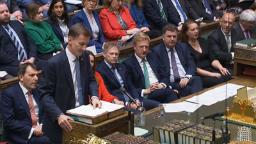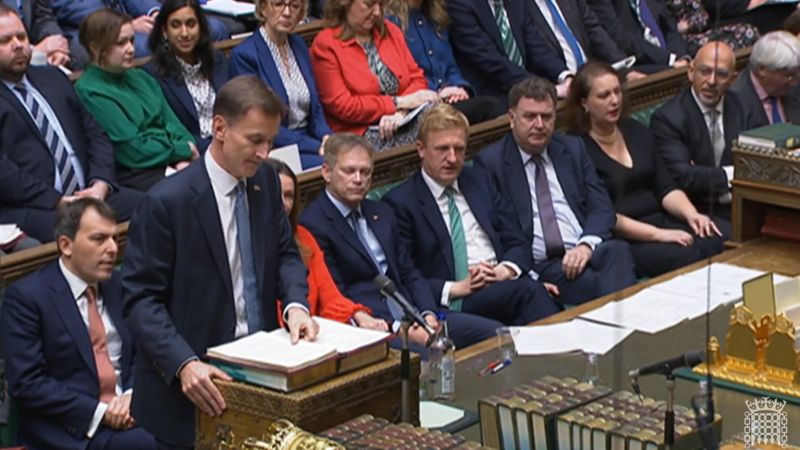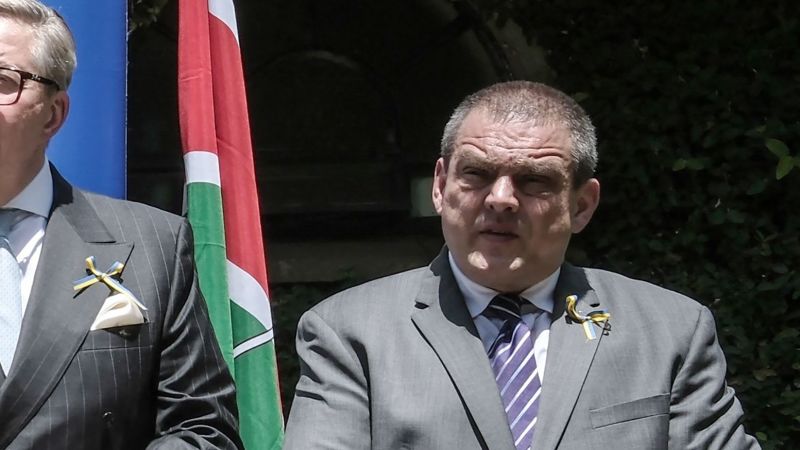‘Difficult decisions’: Britain announces higher taxes and spending cuts


London
CNN Business
—
The United Kingdom has already entered a recession and is battling decades-high inflation, eroding standards of living for millions of people across the country. Now, Britons must also stomach higher taxes and reductions to public services as the government tries to get its finances on more solid footing — underscoring the tough road ahead.
On Thursday, UK Prime Minister Rishi Sunak and finance minister Jeremy Hunt laid out their much-anticipated budget plan aimed at saving £55 billion ($65 billion).
“Credibility cannot be taken for granted,” Hunt said in a speech before Parliament, promoting a “rock-solid commitment” to shoring up public finances, which he acknowledged required “difficult decisions.”
The move marks a major U-turn for the United Kingdom. Less than two months ago, Hunt’s predecessor and former Prime Minister Liz Truss said the government would slash taxes and boost borrowing in a bid to generate growth. But investors revolted against the unorthodox approach, and Truss resigned after just 45 days in office.
Hunt’s new plan underscores the extent to which a fast-changing economic environment is forcing governments to adapt, as well as the need for political leaders and central banks to work in “lockstep” at a delicate moment.
For years, interest rates were at rock bottom and borrowing was dirt cheap. But as central banks aggressively raise borrowing costs in a bid to bring down inflation, that’s no longer the case — putting pressure on countries like Britain to show they can manage their debts, even as a tough recession looms.
Yael Selfin, chief economist at KPMG UK, said other countries with high debt loads could be forced to make similarly undesirable choices.
“It is definitely a wake-up call for other governments,” Selfin said.
The United Kingdom is in a recession that will last just over a year, the country’s budget watchdog said in a new forecast released Thursday. The Office for Budget Responsibility projected that the UK economy will shrink by just over 2%, and will not return to its pre-pandemic size until the end of 2024.
During the recession, the OBR said that real household incomes are expected to plunge by more than 7%, falling back to levels last seen in 2013-2014. More than half a million people are projected to lose their jobs.
Despite this, Hunt said the government had to find to a way to bring down public debt as a proportion of the UK economy in five years, and to keep public sector borrowing below 3% of gross domestic product, or GDP, at that point.
To help achieve that goal, taxes will rise. While “all taxpayers will be asked to contribute,” according to the Treasury, one big change will place more people in the income tax band for the highest earners. The threshold at which earners are taxed at 45% has been lowered from £150,000 ($177,000) to about £125,000 ($148,000).
The United Kingdom is also increasing its windfall tax on oil and gas companies, while slapping a new levy on electricity generators. Hunt previously said that the corporate tax rate will rise to 25% from April.
According to the OBR, the tax burden in the United Kingdom is on track to rise to the highest sustained level since World War II.
Public spending, meanwhile, will be curtailed — though a big chunk of the reductions will take place in two years, after the next election.
“We do have to take difficult decisions on public finances, so we’re going to grow public spending, but we are going to grow it more slowly than the growth in the economy,” Hunt said.
He also said that while Britons would continue to receive support for their energy bills beyond next spring, average households should expect to pay £3,000 ($3,541) annually, up from £2,500 ($2,951).
This time around, investors appeared to be on board. The pound fell 0.8% following Hunt’s speech, to $1.18. It’s risen nearly 5% since Truss stepped down, but remains nearly 13% lower against the US dollar this year. Yields on benchmark 10-year UK government bonds, which move opposite prices, rose slightly to 3.19%.
But there is a risk that the recession could last longer than the OBR has predicted, or that the recovery could be weaker. The Bank of England has said the United Kingdom could be in a recession for two years. That would require the government to recalibrate its plans once more, Selfin said.
“The main worry is that as we progress, we could see a slightly worse environment than what the OBR was forecasting, and therefore the improvements in the public finances may not be as fast,” Selfin said, noting that markets could again become “nervous” in that case.







